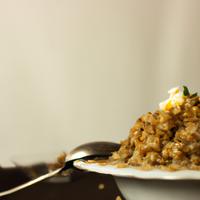
1 serving (100 grams) contains 155 calories, 5.7 grams of protein, 1.1 grams of fat, and 33.5 grams of carbohydrates.

Log this food in SnapCalorie

Nutrition Information
Calories |
369.0 | ||
|---|---|---|---|
% Daily Value* |
|||
| Total Fat | 2.6 g | 3% | |
| Saturated Fat | 0.5 g | 2% | |
| Polyunsaturated Fat | 0 g | ||
| Cholesterol | 0 mg | 0% | |
| Sodium | 11.9 mg | 0% | |
| Total Carbohydrates | 79.8 g | 29% | |
| Dietary Fiber | 10.7 g | 38% | |
| Sugars | 1.9 g | ||
| protein | 13.6 g | 27% | |
| Vitamin D | 0 mcg | 0% | |
| Calcium | 19.0 mg | 1% | |
| Iron | 3.1 mg | 17% | |
| Potassium | 285.7 mg | 6% | |
* Percent Daily Values are based on a 2,000 calorie diet. Your daily values may be higher or lower depending on your calorie needs.
Food Attributes
Source of Calories
About Kasha
Kasha, also known as buckwheat groats, is a nutritious grain-like food widely used in Eastern European and Russian cuisine. Despite its name, buckwheat is not related to wheat and is naturally gluten-free. Kasha is made by toasting or cooking hulled buckwheat kernels, resulting in a nutty flavor and hearty texture. Rich in fiber, protein, and essential minerals like magnesium, phosphorus, and manganese, it supports heart health and digestive wellness. Buckwheat’s low glycemic index makes it a good option for stabilizing blood sugar levels. Packed with antioxidants, kasha may also help combat inflammation. As a versatile ingredient, it can be served as a porridge, side dish, or base for salads and pilafs. While undoubtedly healthy, portion moderation is key, as adding heavy fats or sugary toppings can offset its nutritional benefits. Kasha is a wholesome, energy-boosting staple that fits well into a balanced diet.



